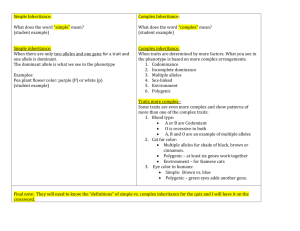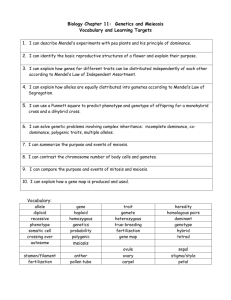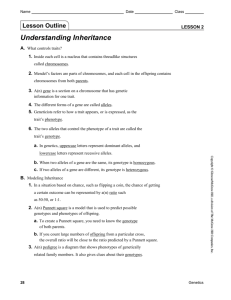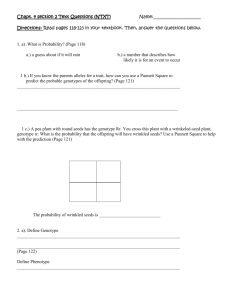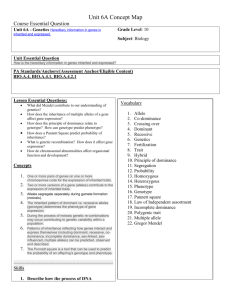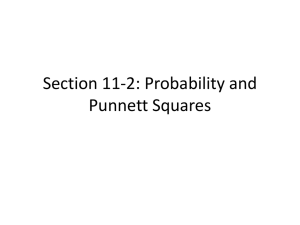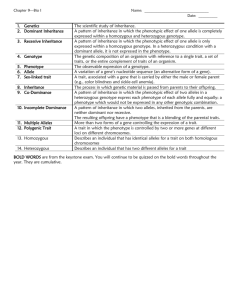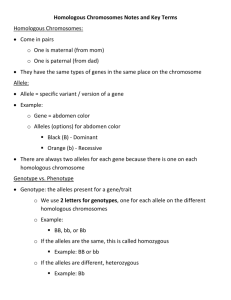Lesson 2 | Understanding Inheritance - Kapuk`s E
advertisement
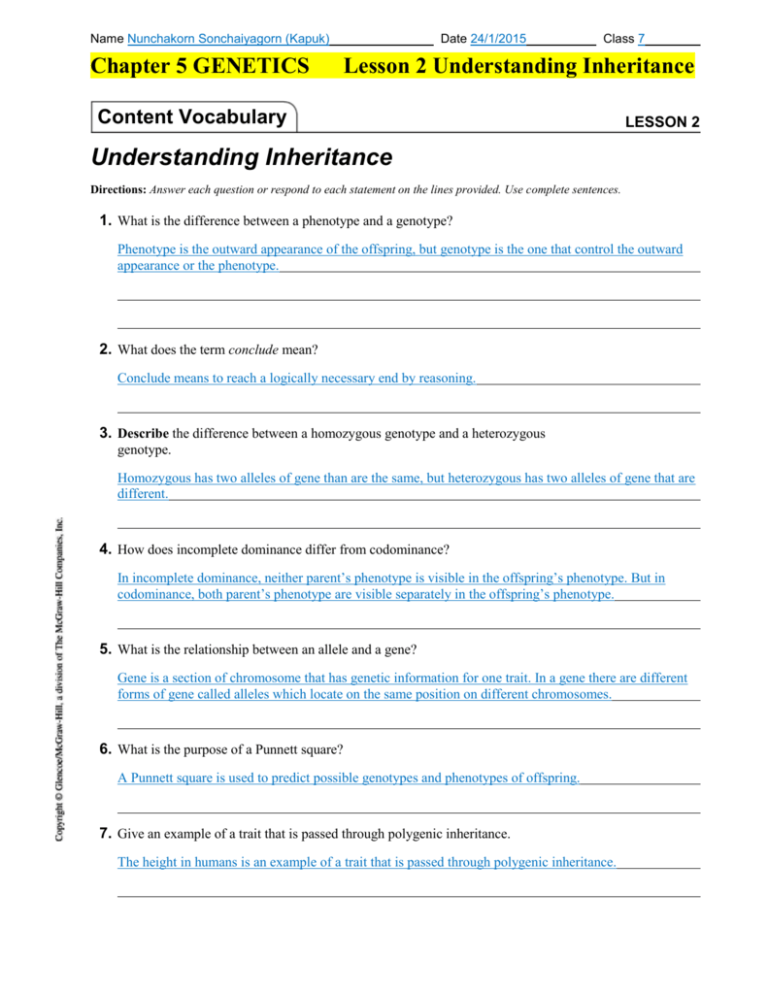
Name Nunchakorn Sonchaiyagorn (Kapuk) Chapter 5 GENETICS Date 24/1/2015 Class 7 Lesson 2 Understanding Inheritance Content Vocabulary LESSON 2 Understanding Inheritance Directions: Answer each question or respond to each statement on the lines provided. Use complete sentences. 1. What is the difference between a phenotype and a genotype? Phenotype is the outward appearance of the offspring, but genotype is the one that control the outward appearance or the phenotype. 2. What does the term conclude mean? Conclude means to reach a logically necessary end by reasoning. 3. Describe the difference between a homozygous genotype and a heterozygous genotype. Homozygous has two alleles of gene than are the same, but heterozygous has two alleles of gene that are different. 4. How does incomplete dominance differ from codominance? In incomplete dominance, neither parent’s phenotype is visible in the offspring’s phenotype. But in codominance, both parent’s phenotype are visible separately in the offspring’s phenotype. 5. What is the relationship between an allele and a gene? Gene is a section of chromosome that has genetic information for one trait. In a gene there are different forms of gene called alleles which locate on the same position on different chromosomes. 6. What is the purpose of a Punnett square? A Punnett square is used to predict possible genotypes and phenotypes of offspring. 7. Give an example of a trait that is passed through polygenic inheritance. The height in humans is an example of a trait that is passed through polygenic inheritance. Name Nunchakorn Sonchaiyagorn (Kapuk) Date 24/1/2015 Class 7 Lesson Outline LESSON 2 Understanding Inheritance A. What controls traits? 1. Inside each cell is a nucleus that contains threadlike structures called chromosomes . 2. Mendel’s factors are parts of chromosomes, and each cell in the offspring contains chromosomes from both parents 3. A(n) gene . is a section on a chromosome that has genetic information for one trait. 4. The different forms of a gene are called alleles . 5. Geneticists refer to how a trait appears, or is expressed, as the trait’s phenotype . 6. The two alleles that control the phenotype of a trait are called the trait’s genotype a. In genetics, uppercase lowercase . letters represent dominant alleles, and letters represent recessive alleles. b. When two alleles of a gene are the same, its genotype is homozygous . c. If two alleles of a gene are different, its genotype is heterozygous . B. Modeling Inheritance 1. In a situation based on chance, such as flipping a coin, the chance of getting a certain outcome can be represented by a(n) ratio such as 50:50, or 1:1. 2. A(n) Punnett square is a model that is used to predict possible genotypes and phenotypes of offspring. a. To create a Punnett square, you need to know the alleles genotype of both parents. b. If you count large numbers of offspring from a particular cross, the overall ratio will be close to the ratio predicted by a Punnett square. 3. A(n) pedigree is a diagram that shows phenotypes of genetically related family members. It also gives clues about their genotypes 2 . Name Nunchakorn Sonchaiyagorn (Kapuk) Date24/1/2015 Class 7 Lesson Outline continued C. Complex Patterns of Inheritance when the offspring’s phenotype is a blend 1. Alleles show incomplete dominance of the parents’ phenotypes. 2. Alleles show codominance when both alleles can be observed in a phenotype. 3. Unlike the genes in Mendel’s pea plants, some genes have more than two alleles, or multiple alleles. 4. ABO blood type is a trait that is determined by multiple alleles. 5. Polygenic (many gene) inheritance occurs when multiple genes determine the phenotype of a trait. 6. Human eye color is an example of polygenic inheritance. D. Genes and the Environment 1. Gene are not the only factors that can affect phenotypes. An organism’s environment can also affect its phenotype. 2. The flower color of one type of hydrangea is determined by the soil 3. Healthful in which the hydrangea grows. choices can affect a person’s phenotype. 3 Name Nunchakorn Sonchaiyagorn (Kapuk) Date 24/1/2015 Class 7 Content Practice A LESSON 2 Understanding Inheritance Directions: On the line before each definition, write the letter of the term that matches it correctly. Each term is used only once. E 1. threadlike structures in cells A. dominance I 2. contain instructions for traits B. pedigree K 3. two different forms of a gene P 4. outward appearance C 5. determines outward appearance F. codominance A 6. represented by uppercase letters G. homozygous M 7. represented by lowercase letters H. incomplete dominance G 8. RR I. genes D 9. Rr C. genotype D. heterozygous E. chromosomes J. environmental factors K. alleles O 10. shows possible outcomes of genetic crosses B 11. shows inherited traits in a family M. recessiveness H 12. produces a blend of the parents’ phenotypes N. polygenic inheritance F 13. when both alleles are expressed O. Punnett square L 14. determines human blood type P. phenotype N 15. when multiple genes determine a phenotype J 16. can sometimes influence expression of genes 4 L. multiple alleles
